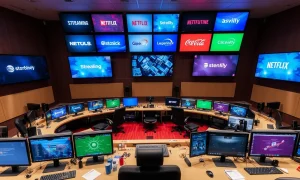Wall Street investors are closely watching potential merger discussions between entertainment titans Paramount Global and Warner Bros. Discovery. This potential **Paramount Warner Bros merger** represents one of the most significant media consolidation moves in recent years. Consequently, analysts are evaluating how this combination could reshape the competitive streaming landscape.
Understanding the Paramount Warner Bros Merger Buzz
Recent reports indicate preliminary discussions about a potential **Paramount Warner Bros merger** have sparked intense market reaction. Meanwhile, both companies face increasing pressure from streaming giants like Netflix and Disney+. Therefore, consolidation appears increasingly necessary for traditional media companies seeking scale.
Key factors driving merger discussions include:
- Streaming competition requiring massive content investment
- Advertising revenue challenges in digital transition
- Content library combination creating valuable IP assets
- Cost synergies potential exceeding $3 billion annually
Market Impact of Potential Media Merger
The **Paramount Warner Bros merger** speculation immediately affected stock prices for both companies. Additionally, competitors across the media sector experienced volatility. Wall Street analysts quickly published assessments of the potential combination’s valuation.
Important market considerations include:
- Regulatory approval requirements for major media consolidation
- Debt load combination creating financial challenges
- Investor sentiment shifting toward media consolidation
- Content licensing agreements requiring renegotiation
Streaming Strategy Behind Merger Talks
A combined **Paramount Warner Bros merger** would create a streaming powerhouse with complementary content libraries. Paramount+ brings popular franchises like Star Trek and Mission: Impossible. Conversely, Warner Bros. Discovery offers DC Comics, Harry Potter, and HBO’s premium content.
The streaming advantages are significant:
- Subscriber base combination approaching 200 million globally
- Content production capabilities spanning film and television
- International expansion opportunities in growing markets
- Bundle offerings with other Warner Bros. Discovery services
Regulatory Challenges for Media Consolidation
Any **Paramount Warner Bros merger** would face intense regulatory scrutiny from multiple government agencies. Antitrust concerns particularly involve market concentration in content production and distribution. However, changing media landscape might justify approval.
Regulatory considerations include:
- FCC regulations governing media ownership limits
- DOJ antitrust review of competitive impacts
- International approvals required across global markets
- Content licensing practices affecting smaller competitors
Financial Implications for Investors
The potential **Paramount Warner Bros merger** creates complex financial considerations for shareholders of both companies. Valuation metrics suggest potential premium for Paramount shareholders. Meanwhile, Warner Bros. Discovery investors would gain scale advantages.
Key financial aspects involve:
- Stock swap ratios determining exchange valuation
- Debt assumption from both companies’ balance sheets
- Synergy realization timeline affecting projected returns
- Dividend policies potentially changing post-merger
Industry Reaction to Merger Speculation
Media industry executives are carefully monitoring the **Paramount Warner Bros merger** discussions. Competitors may need to reconsider their own strategic positioning. Additionally, content creators and talent agencies are assessing potential impacts.
Industry responses include:
- Competitor strategies adapting to potential market change
- Content partner concerns about negotiation leverage
- Employment impacts on overlapping positions
- Technology infrastructure integration challenges
Future Outlook for Combined Entity
If completed, the **Paramount Warner Bros merger** would create one of the world’s largest media companies. The combined entity would possess extensive film libraries, television production capabilities, and streaming technology. However, integration challenges remain substantial.
Potential outcomes include:
- Market positioning against tech streaming competitors
- Content strategy balancing theatrical and streaming releases
- International expansion priorities and investment levels
- Brand management across multiple entertainment properties
Frequently Asked Questions (FAQs)
What would a Paramount-Warner Bros merger create?
The combination would form one of the largest media companies globally, combining Paramount’s film library with Warner Bros. Discovery’s extensive content assets and streaming platforms.
How would this merger affect streaming services?
Paramount+ and Max would likely combine into a single streaming service offering both companies’ content libraries, creating stronger competition against Netflix and Disney+.
What are the main regulatory hurdles?
Antitrust concerns about market concentration in content production and distribution would require approval from both the Department of Justice and Federal Communications Commission.
How would the merger impact employees?
Significant workforce reductions would likely occur in overlapping departments like marketing, distribution, and corporate functions to achieve cost synergies.
What is the potential timeline for completion?
If negotiations proceed, regulatory approval could take 12-18 months, with full integration potentially requiring 2-3 years after deal closure.
How would this affect content creation?
The combined company would have greater resources for content investment but might reduce duplicate projects and focus on franchise development.








